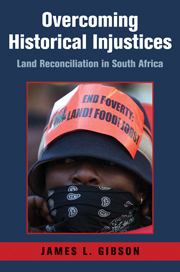Book contents
- Frontmatter
- Contents
- List of Figures
- List of Tables
- Preface and Acknowledgments
- 1 Land Reconciliation and Theories of Justice, Past and Present
- 2 Naming, Blaming, and Claiming on Historical Land Injustices: The Views of the South African People
- 3 Group Identities and Land Policy Preferences
- 4 Applied Justice Judgments: The Problem of Squatting
- 5 Judging the Past: Historical versus Contemporary Claims to Land
- 6 Land Reconciliation and Theories of Justice
- Appendix A A Note on Race in South Africa
- Appendix B The Survey Methodology
- Appendix C The Questionnaire
- References
- Index
- CAMBRIDGE STUDIES IN PUBLIC OPINION AND POLITICAL PSYCHOLOGY
6 - Land Reconciliation and Theories of Justice
Published online by Cambridge University Press: 27 July 2009
- Frontmatter
- Contents
- List of Figures
- List of Tables
- Preface and Acknowledgments
- 1 Land Reconciliation and Theories of Justice, Past and Present
- 2 Naming, Blaming, and Claiming on Historical Land Injustices: The Views of the South African People
- 3 Group Identities and Land Policy Preferences
- 4 Applied Justice Judgments: The Problem of Squatting
- 5 Judging the Past: Historical versus Contemporary Claims to Land
- 6 Land Reconciliation and Theories of Justice
- Appendix A A Note on Race in South Africa
- Appendix B The Survey Methodology
- Appendix C The Questionnaire
- References
- Index
- CAMBRIDGE STUDIES IN PUBLIC OPINION AND POLITICAL PSYCHOLOGY
Summary
The purposes of this book have been twofold. First, I have sought to contribute to understanding the politics of land in contemporary South Africa. Second, and equally as important, I have used the policy context of land to test theories of group identity and sociotropic justice. All of this analysis is grounded in the broader context of theories of transitional justice and societal reconciliation.
Myriad conclusions – some big and some small – emerge from the analysis reported here. First, many ordinary South Africans, and large portions of the black majority, are indeed concerned about issues of historical injustices, and large proportions of the population view land as an unsettled issue from the country's apartheid and colonial past. I do not contend that the various aspects of the land issue are seen by South Africans as being as urgent as the big three: poverty and unemployment, crime, and HIV/AIDs. But addressing the historical injustices of land dispossessions is nevertheless an issue of considerable concern for a majority of South Africans.
I have argued in other contexts that, in comparison to their highly conflictual past, South Africans are remarkably well reconciled (Gibson 2004a). However, the second important conclusion of this research is that land reconciliation cannot be said to be very widespread in South African society today. On nearly every issue connected to land, South Africans of different races are not reconciled; instead, they are deeply and perhaps irrevocably divided.
- Type
- Chapter
- Information
- Overcoming Historical InjusticesLand Reconciliation in South Africa, pp. 211 - 218Publisher: Cambridge University PressPrint publication year: 2009



